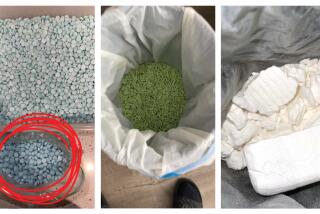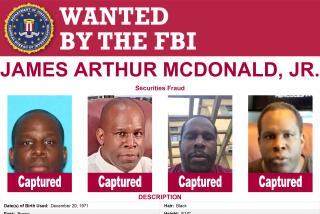Co-founder of drug and alcohol treatment group
- Share via
Thomas “Bud” McDonald, who appeared in some of the “Our Gang” movies as a boy and later helped to found prominent alcohol and drug treatment programs in Southern California, has died. He was 85.
McDonald died Monday at his home in Seal Beach of congestive heart failure, his son, Scott, said.
He began his movie career at 8 after his parents wrote to the Hal Roach Studios in Culver City seeking an audition for their son. A few days later McDonald had a screen test and was cast as Buddy, the boy with the freckles and big ears in several “Our Gang” comedies, including “School Is Out” and “Teacher’s Pet” in 1930. In 1932 he appeared in “Seal Skins,” a Laurel and Hardy movie in which he played an office boy. He also sang on a daytime radio program, “Juvenile Review,” in the 1930s.
McDonald outgrew his acting career before he was a teenager. He dropped out of ninth grade and when his parents divorced he moved with his mother and two brothers to Oregon, where they worked as fruit pickers. Eventually, they returned to California and settled in Bell.
At the start of World War II, McDonald joined the Marines, but a training accident disqualified him from active duty. He became an officer in the Los Angeles Police Department, where he worked for about four years.
By his late 20s McDonald had developed a serious drinking problem. He left the LAPD, in part because of his alcoholism. “He was running with a bad crowd,” his son said.
He robbed a store at gunpoint, was convicted of a felony and sent to prison. There, he started attending Alcoholics Anonymous meetings. “At that point my father was confronted with the fact that his life was going down the drain,” Scott McDonald said.
After serving six months of a longer sentence, McDonald was released on good behavior. He got a job as a truck driver, paid restitution for the robbery and became active in Alcoholics Anonymous.
He often sponsored newer members and went to court with them to settle drunk-driving charges. He got to know several judges.
Starting in the late 1960s, McDonald helped launch educational and treatment programs in public schools with Downey Municipal Court Judge Leon Emerson. They developed a “court card” system that allows offenders to attend alcoholism recovery meetings as part of their probation sentence. The program name refers to the card that parolees have stamped by organizers at meetings and present in court periodically.
The system has been adopted nationally, Emerson said this week.
In the early 1970s McDonald and Emerson co-founded what is now called the Southern California Alcohol and Drug Programs. The Downey agency sponsors rehabilitation programs for men and women and serves about 3,000 people each year. McDonald helped develop projects, helped raise money for them and continued mentoring recovering alcoholics.
“Bud never forgot he’d been down and out and once needed a hand,” Lynne Appel, executive director of the program, said this week. “His greatest satisfaction was having someone stop him and say they had a family, a car, and were paying their mortgage,” years after they had been through rehabilitation.
McDonald, who was born in Coalinga, Calif., on Oct. 1,1922, was married twice. His second wife, Marcia, died in 1996. A daughter, Sharon, died in 2005.
In addition to his son, who lives in New York City, he is survived by a daughter, Debra, of San Francisco, and a brother, Alex, of Florida.
--
More to Read
Sign up for Essential California
The most important California stories and recommendations in your inbox every morning.
You may occasionally receive promotional content from the Los Angeles Times.










